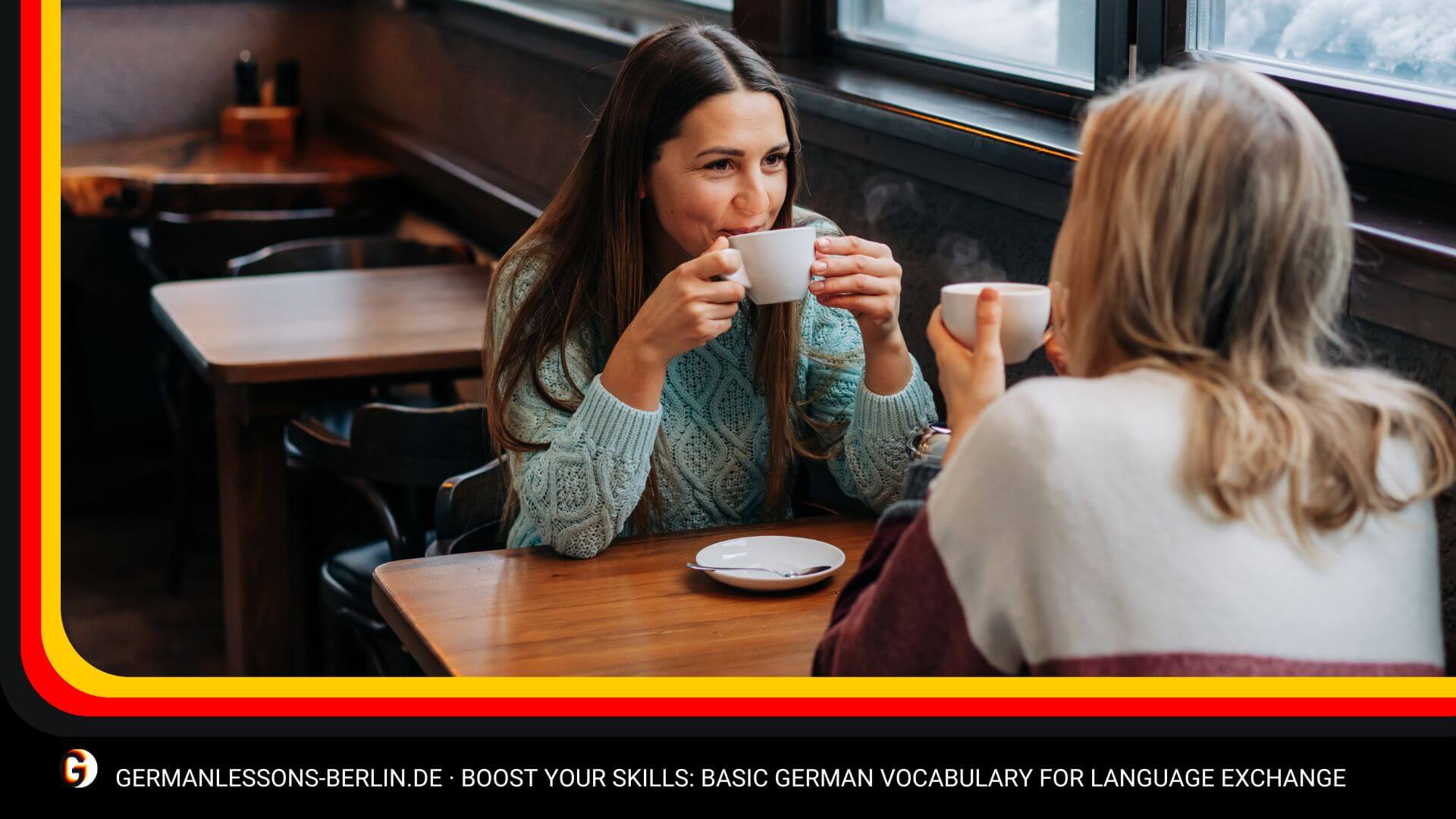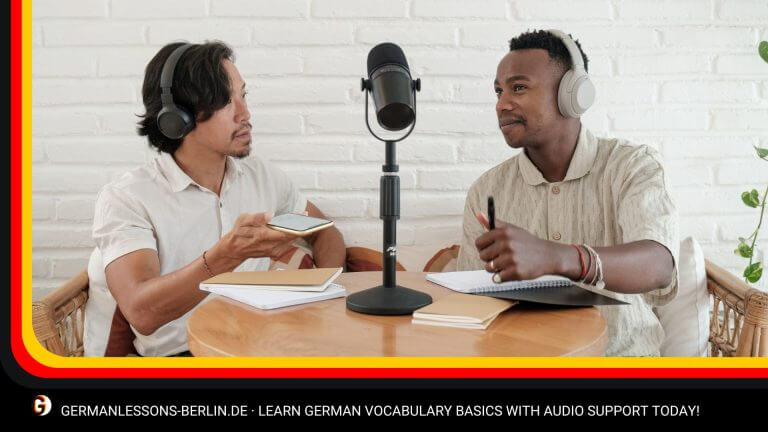Table of Contents
Embarking on a language exchange is like setting out on an exhilarating journey to new lands; and like any explorer, I know the importance of a well-packed linguistic knapsack. My aim is to help you lay the groundwork with essential German words and basic German vocabulary for language exchange, ensuring that you’re equipped to navigate the conversational paths ahead. Language learning resources are the maps I use to chart this course, guiding you from beginner German phrases to greater fluency one step at a time.
As you learn German vocabulary, every new term you grasp becomes a key that opens doors to richer interactions. By focusing on language exchange vocabulary, you enable a two-way street of learning. You’re not just absorbing words; you’re also putting them into practice, making them a part of your active knowledge. For me, the joy of sharing those “aha” moments when a new phrase clicks into place during a lively exchange is unmatched. Let’s embark together on this language learning voyage, making every conversation more engaging and informative.
Key Takeaways
- Broadening your horizons with basic German vocabulary is integral to successful language exchanges.
- Active engagement with language learning resources will build a solid foundation of essential German words.
- A practical approach to learning involves diving into language exchange vocabulary through real-life application.
- Beginning with familiar beginner German phrases can ease the transition into more advanced conversational skills.
- Approach learning joyfully, understanding that language exchange is as much about cultural exchange as it is vocabulary growth.
- Remember, repetition and active use solidify new words, turning them from passive recognition to active dialogue tools.
Embarking on the Language Exchange Journey: Why German?
When I set foot onto the path of mastering a new language, I always ask myself why choose this particular tongue? And in my experience, German is not just a language, it’s a critical tool for broadening cultural horizons and creating business opportunities within the European Union. My journey has shown me that imbibing German language basics does more than facilitating communication—it opens doors to the heart of Europe.
As a language enthusiast myself, I have found that harnessing essential German words through dedicated apps has been instrumental. Platforms such as Smarter German not only provide structured courses but also connect me with native speakers. This dynamic combination of systematic learning and spontaneous conversation enriches my vocabulary and hones my speaking skills.
One basis for learning a language is fostering communication across diverse cultures. With German being a pivotal language in the EU, learning it paves the way for innumerable opportunities in education, business, and interpersonal connections.
But why stop at apps? Language exchange tips I’ve gathered along the way advocate for a more hands-on approach. As I navigate the intricacies of German conversation, I’ve come to realize the irreplaceable value of engaging with native speakers. It’s the exchange of idioms, the laughter over mispronunciations, and the shared triumphs over complex grammatical hurdles that transform basic German phrases into a flowing stream of dialogue.
Below is a comparison of the advantages I have discovered through various methods of learning the German language.
| Learning Method | Advantages | Personal Insights |
|---|---|---|
| Language Learning Apps | Structured courses, vocabulary builders, grammar exercises | Excellent for habitual learning and reinforcing basics |
| Language Exchange Platforms | Real-time conversation, cultural exchange, pronunciation practice | Invaluable for spontaneous usage and understanding native speech patterns |
| Online Courses (e.g., Smarter German) | Interactive exercises, comprehensive study materials | Provides a deep dive into language structure and usage |
In my personal quest, I have found that diving into language exchanges is not just about learning how to articulate thoughts in another dialect; it’s a testament to the potential of connecting with different minds and world views. So, take my word—as someone who’s trekked this rewarding terrain—that starting your linguistic adventure with German is more than a wise choice; it’s an enlightening one.
Essential German Greetings and Introductions
There’s a unique warmth attached to exchanging greetings in a new language, especially when the conversation begins with someone fluent in that dialect. I find that when I use basic German vocabulary for language exchange, it allows me to form connections that resonate on a more personal level. Such phrases aren’t just a formula; they’re a bridge to someone’s world.
From “Hallo” to “Guten Tag”: Starting Conversations Right
The journey through language learning resources has shown me that uttering a simple “Hallo” can kindle a friendship, while “Guten Tag” can lay the groundwork for a formal interaction. As I involve myself in conversations with native speakers and fellow learners, I understand the impact of basic introductions in setting the stage for a productive dialogue. There is depth even in the briefest of exchanges, provided one is equipped with useful German expressions.
The Formal and Informal: “Sie” Versus “Du”
In my personal experiences with language exchange vocabulary, knowing when to address someone with “Sie” (formal you) or “Du” (informal you) is crucial. It’s fascinating how this choice sets the tone of a conversation. It’s not just about politeness; it’s about cultural appreciation and behaving sensitively in social scenarios. For me, striking this balance is the essence of language mastery.
Understanding this linguistic duality enriches your speaking and shows respect for the nuances of German culture.
Here’s a friendly table showcasing some beginner German phrases that I find invaluable:
| English | German | Usage Context |
|---|---|---|
| Hello/Hi | Hallo | Casual greeting |
| Good day | Guten Tag | Formal greeting, used until late afternoon |
| Good evening | Guten Abend | Formal greeting, used in the evening |
| Nice to meet you | Freut mich, dich kennenzulernen | Used when meeting someone for the first time |
| How are you? | Wie geht es dir/Ihnen? | Asking someone about their wellbeing, informal/formal |
While my library of beginner German phrases has blossomed over time, practicing them with someone who speaks the language naturally is where they truly take root. These phrases are more than words—they are your first step into a broader, more connected world.
Whether I’m drafting emails or chatting swiftly over a cup of Kaffee, a sincere greeting using the right salutation makes all the difference. To me, these interactions are a beautifully crafted dance of words and customs, making every hello a doorway to a new adventure.
- Whenever I’m in doubt, I make a note to always start with ‘Sie’ in professional settings.
- Practicing with language exchange partners has been key in understanding the subtleties of these social cues.
In sum, the importance of basic greetings and proper salutations in German can’t be overstated. Through my journey, these useful German expressions have not only expanded my vocabulary but have also led me to appreciate the rich cultural tapestry that makes each interaction so special.
Navigating Everyday German: Key Phrases for Beginners
As I delve into the waters of language exchange, I am mindful of the need to equip myself with a robust anchor of basic German vocabulary for language exchange. I take pleasure in cultivating beginner German phrases not just within my mind’s repository but also by planting them in the fertile soil of daily interactions.
My blueprint for absorbing these useful German expressions often starts with immersing myself in the digital space where language thrives unbounded. Podcasts, rich with conversational cadences, and YouTube channels, brimming with visual context, serve as my guides through the thicket of new terminologies.
It’s in these virtual encounters that words transition from mere sounds to tangible tools, etching deeper into my linguistic consciousness.
As I piece together the puzzle that language learning often is, I am constantly searching for context for these phrases, to understand not just their direct translations but their life within German culture. It’s a fascinating journey, one that slowly erases the line between knowledge and practice.
The basic toolkit I carry consists of phrases that handhold me through many a conversational corridor. They are the sinews that bind the muscles of dialogue, granting me the confidence to both listen and contribute with intent.
Everyday Phrases I’ve Learnt
- To ask for directions, I start with “Entschuldigung, können Sie mir bitte helfen?” (Excuse me, can you please help me?), a phrase that has already saved my skin more times than I can count.
- For casual exchanges, I find “Was machst du heute?” (What are you doing today?) opens up the floor for shared experiences.
- And when parting ways, “Wir sehen uns später” (See you later) leaves the promise of future interaction hanging pleasantly in the air.
Here’s a table of some everyday German phrases that helped me pave my initial pathways:
| Phrase in English | Phrase in German | When to Use It |
|---|---|---|
| Can I help you? | Kann ich Ihnen helfen? | To offer assistance |
| Where is the bathroom? | Wo ist die Toilette? | Asking for a location |
| I would like to order… | Ich möchte gerne … bestellen | Placing an order in a restaurant |
| I don’t understand | Ich verstehe nicht | When clarification is needed |
| How much is this? | Wie viel kostet das? | Enquiring about the price |
As I continue to expand my repertoire of beginner German phrases, my engagements become undeniably richer. With each word and each phrase mastered, I stitch another square into the quilt of my ongoing language adventure.
Describing Your World: German Adjectives and Their Importance
Throughout my language exchange experiences, I’ve found that adjectives are the spice of any conversation. Learning basic German vocabulary for language exchange, I realized these descriptive words offer more than meets the eye. They are not mere decorative items but vital tools that bring life to the canvas of language, helping me not just to “speak” German, but to “paint” with it.
Adding Color to Your Conversations: Descriptive Basics
Adjectives provide the details that transform simple conversations into vivid experiences. When I share stories or describe something close to my heart, using vibrant adjectives shifts the dialogue from mundane to memorable. I’ve noticed how incorporating words like “farbenfroh” (colorful) or “atemberaubend” (breathtaking) in discussions about places I’ve visited doesn’t just inform, but transmits my awe and joy.
Here’s an example of how I deepen my descriptions with German adjectives:
Ich habe einen gemütlichen Cafe besucht, der herzlich und einladend war. Die Wände waren sonnengelb, und die Musik klang seelenberuhigend.
I attended a cozy café that was warm and inviting. The walls were sun-yellow, and the music sounded soul-soothing.
Making Comparisons: Beyond “Groß” and “Klein”
As I construct more complex sentences, I notice how necessary it is to go beyond elementary descriptors like “groß” (big) and “klein” (small). Expressing similarities and differences allows me to paint a more holistic picture of my experiences and thoughts. Recognizing an array of adjectives, and their not-so-obvious counterparts, hands me the brush to illustrate stories with greater precision and color.
Here are some comparison phrases illustrating this diversity:
| Basic Adjective | Comparative | Superlative | English Equivalent |
|---|---|---|---|
| gut | besser | am besten | good, better, best |
| alt | älter | am ältesten | old, older, oldest |
| freundlich | freundlicher | am freundlichsten | friendly, friendlier, friendliest |
| interessant | interessanter | am interessantesten | interesting, more interesting, most interesting |
Moreover, familiarizing myself with the Duden dictionary broadened my perspective on how adjectives modulate meaning and sentiment. It’s fascinating how synonyms can carry such different connotations, perfecting the art of nuance in my conversations.
Learning essential German words in the realm of adjectives has been a cornerstone of my language exchange practice. As essential as beginner German phrases are, it’s the adjectives that truly render my dialogues three-dimensional. So, I embrace the challenge of going beyond the basics, as this elevates my language use from functional to expressive.
May this knowledge of German language basics also inspire you to layer your dialogues with rich descriptions, transforming every conversation into an extraordinary linguistic tapestry.
Building Blocks of Conversation: Common German Verbs
I’ve always found that the essence of fluid communication in German lies in mastering a core set of verbs. My experiences on language exchange platforms have taught me that these essential German words are not just static pieces of knowledge—they’re dynamic elements that empower my interactions. Here’s my take on leveraging common German verbs to enhance your language exchange journey with confidence and authenticity.
On my quest for fluency, I’ve discovered that consistent practice with relevant resources like language exchange tips can help internalize useful German expressions, particularly when it comes to verbs. Engaging in dialogue with native speakers provides the avenue to see these verbs in action, allowing me to appreciate their subtleties and to use them accurately in context.
It’s not only about knowing the word; it’s about understanding its heartbeat—the scenarios it thrives in and the nuances it conveys.
Thus, I’ve set out to share some pivotal verbs that serve as the backbone to any dialogue. Whether it’s arranging a meeting or describing a weekend getaway, these verbs are the workhorses of my conversations.
| Verb in English | Verb in German | Example Sentence in German |
|---|---|---|
| To go | gehen | Ich gehe in den Park. |
| To have | haben | Wir haben Zeit. |
| To make/do | machen | Sie macht ihre Hausaufgaben. |
| To say | sagen | Er sagt die Wahrheit. |
| To come | kommen | Kommst du mit? |
As a passionate language learner, I stress the importance of using these verbs not in isolation, but within the fabric of authentic sentences. Let’s explore some everyday scenarios where these verbs come into play.
Using Verbs to Propel Dialogue
Imagine you need to tell a friend you’re running late. You could use kommen as in “Ich komme später” (I will come later) to impart urgency and politeness. Or if a colleague is curious about your new project, you might explain, “Ich mache eine Präsentation” (I am making a presentation) using machen. These interactions illustrate how foundational verbs build a bridge from simple vocabulary to rich conversation.
In my own real-world exchanges, I’ve gathered a litany of language exchange tips that underscore the practicality of knowing your verbs. For instance, it’s one thing to recognize haben, but another to employ it effectively, as in “Haben Sie einen Stift?” (Do you have a pen?) when in need.
- Each verb holds the potential to unlock a myriad of conversational doors.
- Remembering that practice begets confidence, I’ve often turned to language exchange for real-time reinforcement.
- The fabric of language is intricately woven with these essential German words, making every exchange an opportunity to enhance familiarity and spontaneity.
To me, language exchange is a dance where verbs lead the way, allowing me to pivot from topic to topic with grace. And there you have it—my insights on utilizing common German verbs to enrich our tapestry of dialogue during language exchange.
Food and Drink: Essential Vocabulary for Dining in German
My journey of enriching my basic German vocabulary for language exchange has brought me to the delightful realm of German cuisine. There’s nothing quite like starting your day with a “Kaffee” in hand or unwinding in the local “Bäckerei” with a slice of “Kuchen”. Mastering words for dining out is not just satisfying; it’s a way of embracing the culture and connecting over the shared love of food.
Ordering in a Café: From “Kaffee” to “Kuchen”
As I ventured into cozy cafés and bustling “Konditorei”, I realized that knowing the right terms goes far beyond placing orders. It’s about the experience—the scent of freshly-baked “Brötchen”, the taste of hearty “Suppe”, and the sensation of sipping on a frothy “Cappuccino”. My foray into German eateries has been made all the more authentic with these essential German words at the tip of my tongue.
Here are some phrases and words that have served me well:
- May I see the menu, please? – Könnte ich bitte die Speisekarte sehen?
- I would like to order now – Ich möchte jetzt bestellen
- A coffee with milk, please – Ein Kaffee mit Milch, bitte
- Do you have any vegetarian options? – Haben Sie vegetarische Optionen?
- Can I get this to go? – Kann ich das zum Mitnehmen bekommen?
Language learning resources, be it innovative apps or thoughtfully curated websites, have been particularly beneficial. They offer focused vocab lists that cater to various dining scenarios—helping me internalize phrases for different culinary encounters.
I relish the confidence that comes from knowing how to ask for “eine Tasse Tee” (a cup of tea) or how to compliment the chef with “Das Essen war ausgezeichnet” (The food was excellent).
There’s a rewarding sense of accomplishment when I can navigate menus and make dietary inquiries without hesitation. It’s a testament to how these language learning resources are integral to not just language acquisition but also to enjoying the nuances of German dining culture.
Additionally, I’ve taken pleasure in constructing dialogues while sitting in a quaint café, rehearsing phrases I’ve learned. For example, “Einen Eiskaffee und ein Stück Schwarzwälder Kirschtorte, bitte” (An iced coffee and a piece of Black Forest cake, please).
Below is a table of basic German vocabulary for language exchange that everyone should know when dining out:
| English | German | Category |
|---|---|---|
| Restaurant/Café | Restaurant/Café | Place |
| Waiter/Waitress | Kellner/Kellnerin | Profession |
| Menu | Speisekarte | Item |
| Order | Bestellung | Action |
| Beverage | Getränk | Category |
| Meal | Mahlzeit | Category |
| Dessert | Dessert/Nachtisch | Category |
| Bread | Brot | Food |
| Salad | Salat | Food |
| Bill | Rechnung | Item |
This table has become a cornerstone in my daily practice, transforming each dining experience from a routine meal to a language lesson wrapped in rich, cultural flavors. My advice for fellow language learners? Savor every bite and every word—it’s the spice of life and language learning.
Making Plans: German Vocabulary for Common Activities
As I deepen my dive into the German language, I find the exploration of vocabularies related to hobbies and common activities to be a thrilling addition to my toolkit. Partaking in dialogues about interests is a surefire way to engage in fulfilling language exchanges. With strategically picked essential German words and useful German expressions, I’m able to share my passions and inquire about the pastimes of my conversation partners.
Exploring Hobbies: Words for Discussing Interests
I’ve often turned to online forums and language learning communities as treasuries for discovering new vocabulary. Here, I encounter peers eager to discuss the joys of “das Wandern” (hiking), “das Lesen” (reading), or “das Reisen” (traveling). Interactive games and challenges presented on various platforms reinforce this learning, solidifying new terms while providing entertaining and pragmatic language exchange tips.
Engaging in conversations about someone’s “Lieblingshobby” (favorite hobby) breaks the ice and injects a dose of personal connection into your language practice.
Let me share with you a table of phrases that I’ve found to be indispensable when making plans and discussing common activities during my language exchange experiences:
| Activity in English | Activity in German | Useful Phrase in German |
|---|---|---|
| Playing sports | Sport treiben | Spielst du gern Tennis? |
| Going to the cinema | Ins Kino gehen | Welchen Film möchtest du sehen? |
| Attending a concert | Ein Konzert besuchen | Wen wirst du im Konzert sehen? |
| Photography | Fotografie | Was fotografierst du am liebsten? |
| Traveling | Reisen | Wohin geht deine nächste Reise? |
| Reading books | Bücher lesen | Was liest du gerade? |
Apart from table talk, I cherish the moments when I can freely discuss my interests using newly acquired vocabulary. From “Ich spiele gerne Gitarre” (I like playing the guitar) to “Ich lerne für ein Marathon zu laufen” (I am training to run a marathon), every new sentence is a step towards greater fluency.
- Such dialogue not only enhances my linguistic skills but enriches the exchange with personal stories and shared experiences.
- I’ve learned that the most engaging conversations often stem from simple inquiries like “Was ist dein Hobby?” (What is your hobby?).
- With a couple of these well-chosen phrases, I can make plans, initiate discussions or participate in conversations on shared activities.
In conclusion, by incorporating these useful German expressions into my conversations, I set the stage for a richer and more personable language exchange. It’s here that my burgeoning vocabulary turns into genuine human connection.
Getting Around: Transportation Terminology in German
As I continue to absorb the German language basics, I’ve learned that grasping transportation-related terms is vital for smoothly navigating German-speaking regions. It’s fascinating how beginner German phrases can become so practical, especially when I find myself at a busy Bahnhof (train station) or waiting at a Haltestelle (bus stop). These keywords are not just terms; they are tickets to exploring new places and building language skills that resonate with real-life experiences.
The first time I tried to catch a bus in Berlin, I quickly realized the importance of knowing basic transportation vocabulary. I remember scanning online resources and language learning apps, brushing up on categorized vocabulary. Such preparation proved invaluable and I soon found that ordering a Fahrkarte (ticket) or finding the right Bahnsteig (platform) became second nature to me.
Knowing how to ask, “Wann fährt der nächste Zug ab?” (When does the next train leave?) was not just practical—it significantly eased my travel anxiety.
Below is a table that maps out essential transportation terms I’ve compiled to assist anyone starting out with beginner German phrases related to travel and transit:
| English Term | German Term | Type of Transport |
|---|---|---|
| Train | Zug | Rail |
| Bus | Bus | Road |
| Tram | Straßenbahn | Rail |
| Ticket | Fahrkarte | N/A |
| Timetable | Fahrplan | N/A |
| Station | Bahnhof | Rail |
| Platform | Bahnsteig | Rail |
| Departure | Abfahrt | N/A |
| Arrival | Ankunft | N/A |
| Subway/Underground | U-Bahn | Rail |
Discovering the integration and efficiency of Germany’s transportation system was exciting. But more exhilarating was the freedom I felt being able to maneuver through it using my newfound vocabulary. Gradually, as my list of beginner German phrases expanded, I found myself giving directions to newcomers in the city, an experience that was both empowering and reflective of my growing language proficiency.
- Studying a Fahrplan enhances both your travel planning and your ability to understand time-related expressions.
- Asking for different ticket options at a Verkaufsstelle can be great practice for your numbers and specific travel-related vocabulary.
- Understanding announcements about Verspätungen (delays) can be a practical reality check and a language skill worth having.
Throughout all these endeavors, the pragmatic use of German language basics shone through as an essential facet of cultural immersion. So, to anyone embarking on their language journey, I say: Equip yourself with these foundational terms; they will carry you far and wide across the marvels of German-speaking lands.
Conclusion: Empowering Your Language Exchange with German Vocabulary
Throughout my linguistic quest, understanding the significance of having a foundational Basic German Vocabulary for Language Exchange has been paramount. This pursuit of language proficiency isn’t just about memorizing words; it’s about immersing oneself in cultural nuances and engaging actively with speakers in shared contexts. By harnessing rich language exchange vocabulary, I’ve fostered not only conversations but also connections, reinforcing the communal spirit of learning that language exchange epitomizes.
Alongside fellow enthusiasts and natives, the journey of building language skills has been transformative. Mobile applications such as FluentU and platforms like Smarter German have acted as digital springboards, propelling me towards genuine interactions. This blend of structured learning with the dynamic unpredictability of conversation has been crucial in establishing a robust linguistic framework, while also tailoring my German comprehension to real-world situations.
In synthesizing various online tools and resources, my approach to language exchange has been both methodical and organic. As I continue to expand my vocabulary, I am reminded of the joy and empowerment that come with each phrase learned and every barrier crossed. Armed with an ever-growing Basic German Vocabulary for Language Exchange, I step into diverse dialogues with confidence, ready to exchange not just words but worlds. Whether I am charting a new course or solidifying familiar routes, my language exchange journey symbolizes a passport to infinite possibilities.
FAQ
Why is it beneficial to learn Basic German Vocabulary for Language Exchange?
Learning basic German vocabulary is essential for anyone looking to engage in language exchange because it establishes a foundation for communication, helps you connect with native speakers, and builds confidence in your language skills. It is particularly important as German is one of the key languages in the European Union, creating ample communication and business opportunities.
What are some common phrases I should learn in my language exchange?
Beginners should focus on learning common phrases such as basic greetings like “Hallo” (hello) and “Guten Tag” (good day), introductions, and key expressions for everyday situations. These phrases serve as the building blocks for furthering your language skills and can be learned through various language learning resources.
How can I navigate the formality in German language when meeting new people?
In German, there is a distinction between the formal “Sie” and the informal “du” when addressing someone. Generally, use “Sie” in professional settings or with people you don’t know well, and “du” with family, friends, or young people. Understanding this nuance is important for social interactions in German-speaking countries.
Why are adjectives important in German?
Adjectives are crucial in enriching your conversations and expressing yourself more clearly. They add detail and depth to descriptions, and using them correctly helps you communicate more efficiently as you engage in language exchange. Grasping how different adjectives can change the meaning of what you say is an essential part of mastery in German.
What are the benefits of knowing a variety of verbs in German?
Verbs are the action words that drive communication. A strong grasp of common German verbs enlarges your ability to construct meaningful sentences and engage in fluid conversations, which is essential in language exchange situations. Practicing with native speakers through language exchange platforms can greatly reinforce verb use.
How can I effectively learn vocabulary related to dining out in German?
To confidently order in German restaurants and cafes, familiarize yourself with essential vocabulary for various food and beverages. You can use dedicated websites and mobile apps that provide focused vocabulary lists, as well as engage in practical experiences, like ordering from a German menu, to reinforce learning.
What strategies can I use to talk about hobbies and pastimes in German?
Discussing hobbies and interests is a great way to connect with others in a language exchange. Expand your vocabulary by learning specific words related to common activities. Practicing with interactive games, challenges, and participating in online forums can help hone your skills in this area.
What resources are available to help me understand transportation terminology in German?
There are plenty of online resources, including language learning apps and websites that offer categorized vocabulary lists to help beginners learn terms related to travel and transportation. Taking advantage of these resources makes navigating German-speaking regions much easier.








